(Created page with "{{PCBallerInfobox |title = File:Sahara.png '''Sahara''' |image = File:Saharan Flag.png |caption = <big>'''"Dominium et Libertas"'''</big> |population = '''20.34M''' |capital = *'''Zephyria''' |languages = *File:Cball-Greece.png Greek (SRC official) *File:Berberism.png Berber (BLF official) *File:Cball-UK.png English (TKC & KRA official) *File:Cball-France.png French (unofficial) |demonym = '''Saharan''' |system = *File:Cermon.png '''Ceremon...") |
Tags: Replaced Rollback |
||
| (2 intermediate revisions by 2 users not shown) | |||
| Line 133: | Line 133: | ||
=== {{Bold|The Kekistani Revolutionary Army (Utopian Dreams of Chaos)}} === | === {{Bold|The Kekistani Revolutionary Army (Utopian Dreams of Chaos)}} === | ||
[[File:KRAattack. | [[File:KRAattack.png|thumb|KRA guerillas before an attack on the SRC|180px]] | ||
The [[File:Keksoc.png]] '''Kekistani Revolutionary Army''' originated as a breakaway faction from the TKC. Dissatisfied with the original group's ideologies, they underwent a significant ideological shift and now advocate for the establishment of a utopian anarcho-communist Kekistan. Sandwiched between the territories controlled by the SRC and TKC, the KRA engages in a constant struggle to survive and advance their radical ideals. | The [[File:Keksoc.png]] '''Kekistani Revolutionary Army''' originated as a breakaway faction from the TKC. Dissatisfied with the original group's ideologies, they underwent a significant ideological shift and now advocate for the establishment of a utopian anarcho-communist Kekistan. Sandwiched between the territories controlled by the SRC and TKC, the KRA engages in a constant struggle to survive and advance their radical ideals. | ||
Latest revision as of 08:44, 14 March 2024
The ![]() Saharan Empire, once envisioned as a dominant force across the vast expanse of the Sahara Desert, has now been reduced to a mere fragment of its grand ambitions. The nation emerged from the ashes of
Saharan Empire, once envisioned as a dominant force across the vast expanse of the Sahara Desert, has now been reduced to a mere fragment of its grand ambitions. The nation emerged from the ashes of ![]() French colonial rule with a volatile period of regional instability, as various tribes and groups sought to establish control over the resource-rich desert lands. With its capital in the city of Nouakchott, later renamed to Zephyria, the Saharan Empire became a beacon of hope for those seeking order and prosperity in the otherwise harsh and unforgiving desert.
French colonial rule with a volatile period of regional instability, as various tribes and groups sought to establish control over the resource-rich desert lands. With its capital in the city of Nouakchott, later renamed to Zephyria, the Saharan Empire became a beacon of hope for those seeking order and prosperity in the otherwise harsh and unforgiving desert.
The causes of the ![]() Saharan Empire's civil war can be traced back to a combination of internal issues and government failures. As the empire expanded its influence, the central government struggled to maintain control over the vast and diverse territories. Corruption, power struggles, and economic disparities fueled widespread discontent among the population. The government's inability to address the people's grievances and provide adequate reforms sowed the seeds of rebellion.
Saharan Empire's civil war can be traced back to a combination of internal issues and government failures. As the empire expanded its influence, the central government struggled to maintain control over the vast and diverse territories. Corruption, power struggles, and economic disparities fueled widespread discontent among the population. The government's inability to address the people's grievances and provide adequate reforms sowed the seeds of rebellion.
Frustrated with the central government's ineffectiveness and its failure to fulfill its promises of prosperity, various factions within the empire began to vie for power and influence. These factions emerged with different ideologies, each believing that they held the key to the empire's future. The resulting clash of ideologies and struggle for control has plunged the Saharan Empire into a state of constant civil war, with no faction able to decisively establish dominance.
In the Beginning came the End
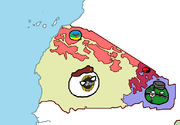
The initial trigger for the civil war was the rise of the Saharan Restorationist movement. A movement started with the ambition to bring the Saharan Empire to it's true glory, the movement was ignored by the government on a better day and brutally repressed on the average day. Support for the movement was fueled when the government attempted to nationalize land ownership, bring rural folk and libertarians to the the reformed SRC's side. As tensions rose a large portion of the military joined the SRC in it's rebellion against the government, while a fight was expected the rest of the military did not stand by the government, they fled to fight along side other emerging factions.
The Saharan Restoration Council (Guardians of the Empire)
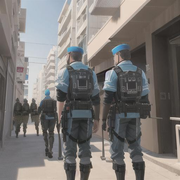
The ![]() Saharan Restoration Council, now fully reformed, stands as the nominal de facto government within the Saharan Empire, exerting the most significant influence in the region. The faction exhibits a strong attachment to Romano-Hellenic aesthetics, driven by a relentless obsession to hunt down and destroy the wizard, a figure who poses a significant threat to their vision of the empire.
Saharan Restoration Council, now fully reformed, stands as the nominal de facto government within the Saharan Empire, exerting the most significant influence in the region. The faction exhibits a strong attachment to Romano-Hellenic aesthetics, driven by a relentless obsession to hunt down and destroy the wizard, a figure who poses a significant threat to their vision of the empire.
The SRC traces its origins to a coalition of military leaders and influential figures who sought to restore order, bring freedom to the Saharan people and reclaim the entire Saharan Desert. Led by General Marcus Aurelius Renatus, a charismatic and stern commander, the SRC emerged from the chaos of the initial stages of the civil war and managed to consolidate power in the western provinces. The council believes in the inherent strength and superiority of the Romano-Hellenic culture and seeks to establish a unitary state that assimilates and subjugates other cultures under Saharan dominion.
Renatus and his loyalists have built a series of disciplined militia forces, collectivily known as the Saharan Phalanxes. This formidable army is known for its strategic prowess, utilizing advanced weaponry salvaged from various conflicts. The SRC's supporters primarily consist of SRC zealots, former military personnel, and disillusioned individuals seeking stability amidst the chaos. The faction maintains control over key resources, such as oil and mineral deposits, which provide them with a significant advantage over their rivals.
Zephyria

The capital city of the Saharan Empire, Zephyria, was once known as Nouakchott, a coastal city located on the Atlantic coast of the western Sahara, it stands as a bastion of power and influence for the SRC, serving as their de facto stronghold in the ongoing Civil War. Zephyria's architecture reflects a blend of ancient Saharan influences, gothic architecture and romano-hellenic aesthetics. The city, despite being confined to a fairly small, with a population of a little over a million, it exhibits a sense of order and control under the governance of the SRC, the faction's emphasis on militarism is evident in the presence of well-organized security forces and military installations strategically positioned throughout the city. The SRC seeks to project strength and authority, showcasing their determination to reunite the fragmented Saharan Empire under their banner, the city serves as the focal point for the SRC's leaders political maneuvering.
The Berber Liberation Front (Guardians of Heritage)
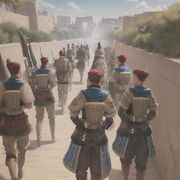
The ![]() Berber Liberation Front represents a faction of Berber separatists within the Saharan Empire. Operating primarily in the northern provinces, they strive to establish a nation that cherishes their heritage while pursuing a vision of social liberation. The BLF seeks to reclaim their cultural identity and traditions, and are fervently opposed to the other factions.
Berber Liberation Front represents a faction of Berber separatists within the Saharan Empire. Operating primarily in the northern provinces, they strive to establish a nation that cherishes their heritage while pursuing a vision of social liberation. The BLF seeks to reclaim their cultural identity and traditions, and are fervently opposed to the other factions.
The BLF's genesis can be traced back to the Saharan Empire's early days when Berber communities faced marginalization and cultural erosion under the Imperial government. Led by charismatic leaders such as Aisha Noura, the BLF quickly gained traction among the Berber population, inspiring a sense of pride in their roots and a desire for self-governance. The faction's members consist of skilled guerrilla fighters and activists who employ a variety of tactics, ranging from nonviolent resistance to small scale military offensives.
One significant division within the BLF arises from ideological disagreements. While the majority adheres to the core principles of cultural preservation and social liberation, smaller sub-factions embrace more radical ideologies. These factions embrace eco-terrorism & esotericism. The BLF's support base includes Berber communities, intellectuals, artists, and activists who champion the cause of cultural revitalization and self-determination.
Trump's Kekistani Crusaders (A Dream Chasing Reality)
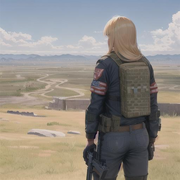
Contrary to their satirical name, ![]() Trump's Kekistani Crusaders are a group of fervent supporters of former president Donald J. Trump who embarked on a mission to create their dream nation within the Sahara. This faction's control is limited to the most eastern provinces of the Saharan Empire, near the border with Nigeria.
Trump's Kekistani Crusaders are a group of fervent supporters of former president Donald J. Trump who embarked on a mission to create their dream nation within the Sahara. This faction's control is limited to the most eastern provinces of the Saharan Empire, near the border with Nigeria.
The TKC emerged as a result of fervent support for the Trump family in the United States. Many of their members were disillusioned with the political landscape and sought a fresh start in the untamed lands of Africa. Led by charismatic figures like Colonel Richie Thatcher, the TKC brought with them a zealous belief in their ideals and a vision of a new homeland shaped by their ideology, with their stringent immigration policies and adherence to Trumpian-era principles.
Drawing inspiration from the online Kekistan movement, the TKC incorporates internet humor and memes into their cultural fabric. They have established a strong propaganda machinery, disseminating their ideas and recruiting followers through various online platforms. Though not to be underestimated, the TKC's limited territorial control restricts their ability to exert influence beyond their borders.
Parliament of Kekistan
Despite their limited control over the eastern provinces, the TKC has established a unique parliamentary system to govern their territories. The parliament serves as a platform for political debates, legislation, and decision-making, allowing different parties to represent their constituencies and contribute to governance. The system aims to ensure a balance of power and foster cooperation among the parties, even with their ideological differences. Seats are distributed among the political parties based on the popular vote and regional representation. With a total of 100 seats divided among three main political parties, each party represents distinct ideologies and priorities that shape their approach to governance and the ongoing conflict.
The Kekistan First Party (KFP)
- Ideologies:
- Seats: 46
- The KFP takes a more pragmatic and inward-looking approach within the parliament, their central goal is to end the civil war and focus on rebuilding and stabilizing the country. The KFP recognizes the toll the conflict has taken on Kekistan's infrastructure, economy, and social fabric. They believe that a united and prosperous Kekistan can only emerge through a concerted effort to mend internal divisions and address pressing domestic issues. The KFP aims to redirect resources and attention from the war towards initiatives such as infrastructure development, social programs, and economic reforms. With a substantial presence in parliament, the KFP advocates for a diplomatic resolution to the conflict and a swift return to domestic governance.
The Kekistan Nationalist Party (KNP)
- Ideologies:
- Seats: 37
- The KNP is an influential political force within the parliament, with a strong anti-Nigerian sentiment, the KNP prioritizes funding and supporting the Kekistani resistance in neighboring Nigeria. The KNP believes that Kekistan's survival and future prosperity hinge upon maintaining a strong and independent Kekistani identity, they advocate for diverting resources and military efforts to protect and support their fellow Kekistanis fighting in Nigeria, aiming to bolster their cause and secure Kekistan's influence in the region.
The Radical Vanguard Party (RVP)
- Ideologies:
- Seats: 15
- The RVP represents the most extreme and militant faction within the parliament, the believes that only by completely destroying all of Kekistan's adversaries can true victory be achieved. The RVP rejects compromise and seeks to intensify military efforts, dedicating every available resource to the war. They argue that Kekistan's survival hinges upon decisively eliminating all threats, internal and external, through aggressive military campaigns. The RVP holds a smaller number of parliamentary seats but wields significant influence due to their passionate and radical following. Their supporters advocate for a relentless pursuit of victory, often disregarding the consequences and collateral damage caused by their actions.
The Libertine Party of Kekistan (LPK)
- Ideologies:
- Seats: 2
- The LPK envisions a world where the individual is liberated from the constraints of government intervention and regulations. They advocate for the abolition of the existing government system, including dismantling bureaucratic apparatuses and removing legal barriers that hinder personal freedom. The party believes that an unrestricted capitalist system, combined with the uninhibited consumption of alcoholic beverages, will lead to a utopian society where individual autonomy and prosperity thrive.
The Kekistani Revolutionary Army (Utopian Dreams of Chaos)
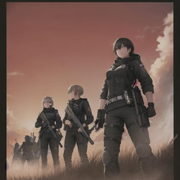
The ![]() Kekistani Revolutionary Army originated as a breakaway faction from the TKC. Dissatisfied with the original group's ideologies, they underwent a significant ideological shift and now advocate for the establishment of a utopian anarcho-communist Kekistan. Sandwiched between the territories controlled by the SRC and TKC, the KRA engages in a constant struggle to survive and advance their radical ideals.
Kekistani Revolutionary Army originated as a breakaway faction from the TKC. Dissatisfied with the original group's ideologies, they underwent a significant ideological shift and now advocate for the establishment of a utopian anarcho-communist Kekistan. Sandwiched between the territories controlled by the SRC and TKC, the KRA engages in a constant struggle to survive and advance their radical ideals.
A group of disillusioned members, led by the charismatic revolutionary Alexis Rousseau, rejected the TKC's Trumpist nationalism and sought a more egalitarian and communal society. Embracing anarcho-communist principles, the KRA envisions a Kekistan free from authority, where power is decentralized and resources are shared among the populace.
Despite their ideological fervor, the KRA faces significant challenges due to their limited resources and the constant threat of attack from the SRC and TKC. Their strength lies in their dedication to direct action, utilizing decentralized networks and guerrilla tactics to disrupt their enemies. The KRA's support base consists of disillusioned former TKC members, radical leftists, and individuals disenchanted with the prevailing systems of governance.
Non-Participating Factions
 The Virtualist Cult (Embracing Technological Utopia)
The Virtualist Cult (Embracing Technological Utopia)

Within the fractured Saharan Empire, a faction known as the Virtualist Cult has carved out its own unique existence. This faction consists of a group of anime cultists who have established an underground technological utopia called Auijuren. The Virtualist Cult's most radical faction has subscribed to an ideology known as Seijaism that advocates for continuous social upheaval, extreme egalitarianism, internationalism, secularism, and the pursuit of a perpetual revolution to overturn existing social orders.
The Virtualist Cult traces its roots back to a coalition of technology enthusiasts and anime aficionados who sought to escape the turmoil and conflicts of the civil war. Led by the enigmatic figure known as the Supreme Otaku, the cult established Virtual Metropolis, a sprawling underground city where technology and anime merge seamlessly. In this virtual heaven, they aim to transcend the limitations of the physical world and immerse themselves in an alternate reality.
The Virtualist Cult possesses advanced technological capabilities, leveraging their expertise in virtual reality, artificial intelligence, and robotics. They are known for their development of cutting-edge technology, including lifelike androids, neural interfaces, and immersive virtual experiences. The faction attracts individuals fascinated by the intersection of technology and anime, drawing in talented engineers, programmers, and artists who contribute to their technological utopia.
While the Virtualist Cult remains isolated from the ongoing civil war, they maintain a careful balance of neutrality, ensuring their self-contained society remains protected. Their influence is limited to Auijuren and the surrounding areas, where they thrive on their innovative creations and the shared enthusiasm for Japanese pop culture.
 Illinois Corporate Outposts (Endless Controversy)
Illinois Corporate Outposts (Endless Controversy)

Amidst the chaos of the Saharan Empire's civil war, the Illinois Corporate Outposts have established a controversial presence. This faction, driven by profit, sought to exploit the vast reserves of silica-rich sand in the Sahara, in the industrial-scale production of environmentally friendly glass. Rumors persist that they employ Berber child slavery in their operations, further inflaming tensions between the Outposts and the Berber Liberation Front.
While the Illinois Corporate Outposts are not directly engaged in the civil war, their presence exacerbates tensions and conflicts in the region. The BLF vehemently opposes their operations, viewing them as exploitative and detrimental to their people and the environment. The Outpost's supporters primarily consist of multinational corporations, business interests, and those who benefit from their economic activities, like the SRC, who are often turning a blind eye to the allegations of human rights abuses.
 The Baguetteman (Elusive Psychic Wizard)
The Baguetteman (Elusive Psychic Wizard)
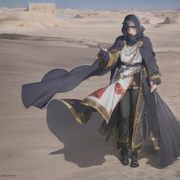
In the fractured Saharan Empire, a figure known as the Baguetteman has become the subject of fascination, fear, and widespread desire for his demise. Étienne Leclair, a French-speaking psychic wizard, has managed to evade capture and is pursued by various factions, each with their own motivations and agendas. His origins and true identity remain shrouded in mystery. Rumors and legends circulate, claiming that he possesses immense psychic powers, capable of altering reality and manipulating minds. Some whisper that he is a remnant of a forgotten ancient civilization, while others believe him to be an otherworldly being.
The Leclair embodies an enigmatic and chaotic force, challenging the established norms and systems of the Saharan Empire, his actions are often unpredictable and aimed at destabilizing the existing power structures. Despite the fervor surrounding his presence, he remains elusive, his ability to vanish without a trace and his mastery of psychic abilities have made him a figure of both awe and terror. Factions across the Saharan Empire seek to capture or eliminate him, viewing him as a threat to their goals.
While the Baguetteman does not actively participate in the civil war, his enigmatic existence has become intertwined with the chaos and struggles of the region. His mere presence is a catalyst for conflicts, as factions vie to harness his power, understand his true nature, or eradicate him to maintain their own control.